What I heard sitting in the 5th row at Work Life Forum? (Part 1)
Monday, 14. November 2022

Zama is a communications trainee at the WORK2030 Program. She is also a business and languages student at Haaga-Helia University of Applied Sciences.
What I heard sitting in the 5th row at Work Life Forum 2022...
Participating the Work Life Forum 2022 gave a lot of food for thought. In this two-part blog, I share some of those key points. This insight sparked a curiosity, which further led me to choose a thesis topic for my business studies at Haaga-Helia University of Applied Sciences. In the second part of this blog, where I write about the afternoon sessions at the Work Life Forum Finland 2022, I will share a bit more about my thesis.
The discussions that took place at the Work Life Forum Finland 2022 were centered around the most important issues in working life and the economy that affect working life in Finland and around the world. Decision makers, researchers, economists, academicians as well as others involved in the changes in workplaces and the future of working life participated. I strongly believe that the aim of the event – to inspire an ongoing dialogue about work life in Finland in the future – was achieved.
The event commenced with a speech from Matti Vanhanen, Speaker of the Parliament, who, among other things emphasized the significance of trust in the future of working life – the desire to trust and the desire to be worthy of trust.
Minister of Social Affairs and Health, Hanna Sarkkinen, then took the stage to highlight that a good society cannot exist without a good working life, and therefore, the goal we must strive towards is the best working life in the world, in the happiest country in the world. Sarkkinen pointed out that concrete actions in the field of skill development, immigration, and inclusion are needed to achieve this goal – but not without investing in well-being and endurance at work.
Research professor Heikki Hiilamo (Finnish Institute for Health and Welfare) further supplemented the discourse with a speech about resilience and its indispensability in the work life of a rapidly changing world. Hiilamo also joined Sirpa Pietikäinen (MEP), Jarno Limnéll (Work Life Professor, Aalto University), and Susa Nikula (Director, LähiTapiola) in the first of the panel discussions, where the necessity of good leadership in turbulent times and a reminder to be hopeful were touched upon.
Tuomo Alasoini, research professor at the Institute of Occupational Health, took the stage next, cautioning against being complacent about the successes of the past. Alasoini also posed some important questions about the disappearance of Finland’s intellectual capital, inconspicuous flaws in the Finnish education system that are displayed in the statistics related to education levels and gender-gap in education, and lastly – Who should do what to mitigate these circumstances?
Though the statistics are concerning, in the next panel - alongside Alasoini, Jarkko Eloranta (Chairman, SAK), and Minne Helle (Deputy CEO, Technology Industries of Finland) - Jaana Sandström (vice-rector of LUT university) had a more positive view about the state of education, while emphasizing that solutions are needed right away.
At lunch, conversation flowed, ideas were hypothesized, and connections were made – with a beautiful performance by Pekka Niemi (ONEVIOLIN), which intended to lighten the mood, but instead wound up astonishing the audience.
As a communications trainee in the WORK2030 Program, I have gained invaluable insight into the working of a national development program and seen firsthand how different actors in the public and private sectors join hands towards a common goal. You can read more about the WORK2030 Program here.
- Etusivu
- Tietoa ohjelmasta
- Tulevaisuusvuoropuhelu
- Työkaluja
- Johtajuuden kehittäminen
- Työelämän tilannekuva
- Hybridityö, etätyö ja lähityö (HELP)
- Hyvinvointia työstä 2030-luvulla
- Kohti työtä 2030 -webinaarit
- MEADOW-tutkimus
- MEADOW ICT-alan juttusarja
- Sujuvaa aivotyötä opetusalalle
- Työelämäfoorumi Suomi 2026
- Työelämätapahtumia
- Työelämän tilannekuvia
- Työmarkkinajärjestöjen vuoropuhelu digitalisaatiosta
- Työ nyt ja tulevaisuudessa: Eväitä ajatteluun luentosarja
- Viisi ratkaisua tulevaisuuden työelämään
- Viestintä ja kampanjat
